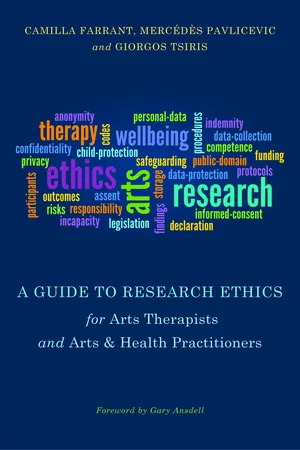![]()
PART 1
Research Ethics
The Bigger Picture
![]()
CHAPTER 1
Research Ethics Basics
Keeping informed
Rather than a narrative with a sequential plot, this chapter assembles various foundational concepts and terms, in order to orientate and induct practitioner-researchers into the research ethics ‘culture’ – or rather ‘cultures’.
Living ethics
Any statement about ethical living and working signals an intentional enactment of an absorbed code of right and wrong, of being alert to the ‘common good’ and of being in tune with the current social norms for what constitutes ‘good’ behaviour. More than a ‘performance’, though, there are foundational ethical principles embedded in our collective norms: the Ten Commandments, the Hippocratic Oath, and – depending on where we live – the criminal justice system, Fairtrade coffee and clothing. Most disciplines, institutions and professions develop distinctive ethical norms that signal common values and good practice that invite the public’s trust.
However, the linking of ethics with research is fairly recent. The Victorian English ‘displayed’ Aboriginal people to the public and trumpeted the science of measuring skulls to assess IQ. The Tuskegee Syphilis Study deliberately prevented men with syphilis from known treatment in order that their research continue uninterrupted (Brandt, 1978). Within recent memory, multinational drug companies tested anti-viral HIV drugs against placebos in African, Caribbean and Asian countries, allegedly bypassing ethical standards that govern research in their respective countries, while in New Zealand women with pre-cancerous symptoms were divided into two groups without their knowledge, and only one of the groups was treated for their symptoms (Smith, 1999). More recently, babies’ organs were retained for research at Alder Hey Hospital in the UK, without their parents’ knowledge or consent.
At the time, each of these actions was justified in the name of ‘science’ and able to proceed apparently unchallenged until well after the events. Viewed through a contemporary prism, it is easy to criticise the ethical and moral norms that would have sanctioned such practices, and yet contemporary critiques of the social collusion and acceptance of such scientific endeavours signal the changing landscape of social values.
When research involves the study of living beings – and this guide concerns research with human beings – ethical research is based on the understanding that, at the very least, research participants are not harmed. People need to be thoroughly informed about the research, about the nature of their participation, and need to have provided their explicit consent to participate on that basis. However, when research designs are based on obscuring the ‘real’ purpose of the study (as in the examples above), where powerful economic principles are at stake, where relationships of political and social hegemony are constellated, and where historical notions of intellectual superiority and inferiority dominate research designs, the territories of information and consent become complicated.
For those arts therapists and arts-based practitioners who work with people whose condition renders them unable to understand the nature of the research participation, or to give explicit consent on the basis of this understanding, research ethics are particularly complicated. By remaining informed about the changing landscape of research ethics, practitioners can ensure that all research participants are kept safe and respected, and that the researchers remain ethically responsible and accountable.
In the beginning: the Declaration of Helsinki
Before the Pure Food and Drug Act of 1906, no regulations regarding the ethical use of people in research existed. However, throughout the twentieth century, the necessity for standardised rules and regulations became increasingly apparent, resulting in the passing of legislation that continues to inform research ethics to this day.
In 1946, 23 German physicians were charged for conducting medical experiments on thousands of concentration camp prisoners without their consent; as a result, most of the subjects of these experiments died or were permanently crippled. The Nuremberg Code of 1948, although not a legally binding document, was developed in direct response to this case and advocated that all research subjects should give their voluntary consent to participate.
After several similar heavily publicised cases of ethically dubious research, the Declaration of Helsinki, a document that sets out ethical principles for human medical experimentation worldwide, was adopted in 1964. Developed by the World Medical Association (WMA), it is widely regarded as the cornerstone document of research ethics practice involving people, since it continues to inform research ethics principles today. The Declaration is not a legally binding document in international law. Rather, its authority is drawn from the degree to which it has influenced national or regional legislation and regulations. From this document and its subsequent revisions, standardised ethical codes of conduct have been developed worldwide. These codes of conduct are based on the ethical principles of justice, beneficence and respect. The Declaration of Helsinki states five research ethics anchors that are still upheld to this day:
•Research protocols should be reviewed by an independent committee prior to initiation.
•Informed consent from research participants is necessary.
•Medical research should be conducted by medically/scientifically qualified individuals.
•Risks should not exceed benefits.
•Medical research with humans should be based on results from laboratory experimentation.
The Declaration of Helsinki calls for all research worldwide that involves people to be reviewed by a Research Ethics Committee (REC) before it takes place. The Declaration of Helsinki states that:
The research protocol must be submitted for consideration, comment, guidance and approval to a research ethics committee before the tri...
